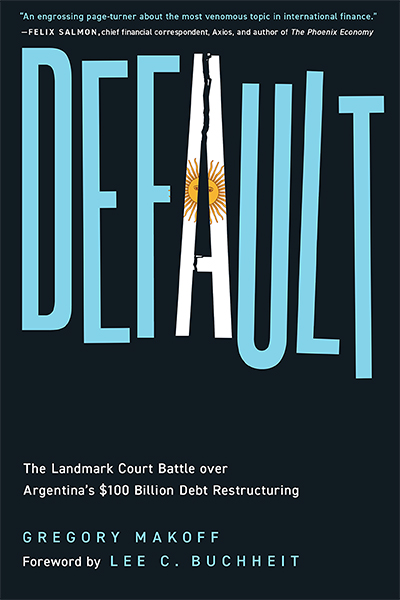Default: The Landmark Court Battle over Argentina’s $100 Billion Debt Restructuring. 2024. Gregory Makoff. University of Georgetown Press.
In his autobiography, preeminent financier William R. Rhodes notes a phrase inscribed on the gold Cross pen used by Nicaraguan authorities to sign off on their 1980s debt restructuring with private creditors: “Firmar me harás. Pagar jamás.” The phrase translates to “You can make me sign, but you’ll never make me pay” — a prescient warning that proved true.
Gregory Makoff continues in the tradition of Rhodes with his book Default: The Landmark Court Battle over Argentina’s $100 Billion Debt Restructuring. He has penned the authoritative take on the most important debt restructuring (other than Greece) in the history of global finance. A physicist by training, Makoff worked as a banker for more than two decades, advising developing nations on debt management policy. He then moved on to scholarly pursuits at the Centre for International Governance Innovation and at the Mossavar-Rahmani Center for Business and Government at the Harvard Kennedy School.
Perhaps it took the transactional experience of a banker, combined with a physicist’s training to derive complexity, to establish this historical narrative for posterity.

Argentina’s debt restructuring tests the theoretical limits of chaos theory. As Henri Poincaré famously noted, “An accumulation of facts is no more a science than a heap of stones is a house.” Makoff’s feat is to build his narrative as a thriller without losing the detailed facts valued by specialists. I read the book in 48 hours.
Readers will inevitably develop empathy for Judge Thomas Griesa, who serves as a central actor in his role overseeing the case for the US District Court for the Southern District of New York. Griesa ultimately broke through a decade of “uniquely recalcitrant” behavior from Argentina with a legal interpretation that prevented Argentina from paying interest on new bonds before settling amounts owed to holdout creditors from its earlier debt restructuring.
The author avoids a simplified hero-versus-villain narrative. Makoff demonstrates how court cases were steered by rationalized self-interest on both sides and deterministic properties governed by the initial conditions of international lending agreements. Given this pragmatic and apolitical approach, investors, scholars, and policymakers alike will find value in Default.
For investors, Makoff provides a healthy reminder to read the terms of one’s bond documentation. Only by understanding the lessons of history can investors navigate the current generation of sovereign debt distress. The author explains how the regrettable decision to not include exit consents in the original debt restructuring allowed some minority creditors to engage in an eventually successful holdout strategy.
For students and professors, Makoff sticks the landing in authoring both a scholarly and practical history. Much ink has been spilt in academic circles on how sovereign debt markets work in theory. It took a practitioner like Makoff to explain how the world is rather than how it is supposed to be.
For policymakers, this historical narrative is well timed as newly contemplated reforms are being reviewed in both multilateral (Global Sovereign Debt Roundtable) and legislative (proposed legislation in New York state) forums. The international bond market can be a positive force in developing economics, allowing countries to navigate from their present to their future by pulling forward investment. As scholar Barry Eichengreen reminds us, however, sovereign debt is a “Janus-faced” asset class. If mismanaged, sovereign borrowing can lead to default and an arduous process to manage through an evolving debt resolution architecture (sovereign nations cannot file for bankruptcy).
Default is ultimately an origin story for enhanced collective action clauses (CACs), a modernization of international lending agreements that bind majority agreements for debt restructuring onto the minority. This approach prevents a repeat of the contentious holdout creditor dynamic in Makoff’s Argentina saga. As the US Court of Appeals for the Second Circuit stated in its review of Judge Griesa’s ruling, “It is highly unlikely that in the future sovereigns will find themselves in Argentina’s predicament.” Thanks to CACs, one can hope this will be the last book that is necessary to describe a decade-long debt restructuring.
If you liked this post, don’t forget to subscribe to the Enterprising Investor.
All posts are the opinion of the author. As such, they should not be construed as investment advice, nor do the opinions expressed necessarily reflect the views of CFA Institute or the author’s employer.
Image credit: ©Getty Images / Ascent / PKS Media Inc.
Professional Learning for CFA Institute Members
CFA Institute members are empowered to self-determine and self-report professional learning (PL) credits earned, including content on Enterprising Investor. Members can record credits easily using their online PL tracker.
